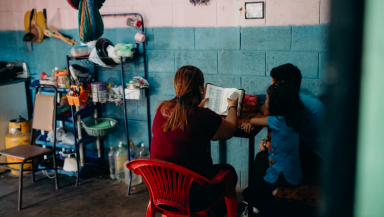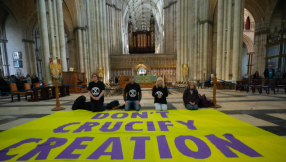
This article by Cris Rogers is a response to a recent column by Haril Kazindra who argues that child sponsorship creates dependency.
For many years, I viewed child sponsorship with scepticism. I questioned whether it was an outdated model that created dependency and reinforced a saviour complex - Western Christians swooping into communities with a solution that, at best, seemed transactional and, at worst, felt colonial. It all made me feel very uncomfortable.
In a time where international development has rightly evolved towards locally led, self-sustaining solutions and partnership-driven models, does child sponsorship still have a place?
Local Leadership
Stepping into a Compassion project in Uganda, based in a local church, I was struck by the sheer ownership of that local church. I had assumed the programmes would be run by Westerners, imposing their vision of progress. Instead, I encountered Ugandan pastors, community leaders, and church members passionately committed to transforming their own neighbourhoods, delivering holistic care to children in that area.
What I saw was a model of true partnership: a vibrant, locally led movement where churches are empowered to actively live out their mission.
I spent some time with Pastor Stephen of Kigungu Full Gospel Church, a local partner of Compassion who deliver the holistic child development programme to 300 children in their local community. He was keen to emphasise why they are now named FULL Gospel Church.
In their early years they focused on teaching and preaching the Gospel, but something was missing. In his words, Jesus had given Christians the Great Commission, but they had been guilty of the ‘Great Omission’ - they were not actively living out the good news and reaching into their community to demonstrate God’s love in deed. A partnership with Compassion was a powerful and effective way to address this.
My visit coincided with Innovation Week. Run by the Compassion Uganda team, it’s a space where local leaders pitch fresh ideas for addressing community needs. These leaders weren’t waiting for someone else to provide solutions - they were creating them. These churches are not passive recipients of financial support but dynamic centres of change. They nurture children, support families, and launch initiatives that address systemic poverty.
More Than Child Sponsorship
Before my visit, I had understood Compassion’s work primarily in terms of child sponsorship. What I hadn’t grasped was the holistic, transformative impact this has not only on the child but on entire families and communities.
I was welcomed into the home of an inspiring teenager called Jotham, whose sponsorship not only provided education but enabled his family to build a sustainable future. Through a small gift from Jotham’s sponsor, they purchased livestock, allowing them to start a small farm and become self-sufficient. His education wasn’t just about school but economic empowerment, resilience, and long-term sustainable change.
It was another privilege to meet Jaja and her grandson Job. Eight-year-old Job is enrolled at the project in his local church and receives schooling, nutritional support, Bible teaching and much-loved play time with his friends. But he used to return home from a day at the project and bed down on the dirt floor with his family, sheltering under a rusting tin roof held up by teetering walls of crumbling mud bricks, rainwater rolling through the holes above their heads. What’s the point in giving a child an education and dreams for the future if the house he lives in is unsafe and unsanitary?
The project secured funding for an intervention and, on the day I visited, Jaja and Job literally cut the ribbon to officially open their new home: a beautiful, secure and spacious house, with solid floors, walls and roof, and a source of great pride and joy for the family. As Jaja and Job stepped over the threshold, I was invited to offer a prayer of blessing. My prayer was that they would continue to know the joy of the Lord and that the gift of that house would be a blessing for the family and for their community.
When you hear “child sponsorship”, it’s easy to assume that the impact is only seen in the life of that one child, to overlook the ripple effect that support can have on their whole family and community. The projects I witnessed in Uganda were investments in the local church and the local neighbourhood, as much as they were investments in the children there, creating something truly transformative. Because if a child is educated, they then take that back to their family and they take it back to their street.
A Call to Reevaluate
If you have ever had questions about the work of child sponsorship organisations like Compassion, it’s worth taking a closer look. What I saw of their approach to holistic child development - delivered through partnerships with local churches and supported by sponsors around the world - reflects a commitment to nurturing not just individual children, but entire communities.
When we choose to support this kind of ministry, we’re helping to equip young lives with the tools and relationships they need to flourish. More than that, we’re joining in a wider Kingdom effort, empowering local leaders, and contributing to the work of the Gospel in tangible, lasting ways. And this is happening in community after community, quietly but powerfully.
Loving our global neighbour, empowering the local church to love and transform their communities and to release children from poverty into all the fullness of life Jesus offers – what’s outdated about that?
Rev. Dr. Cris Rogers is a Church leader at All Hallows Bow in Tower Hamlets and is on the board of Spring Harvest.













